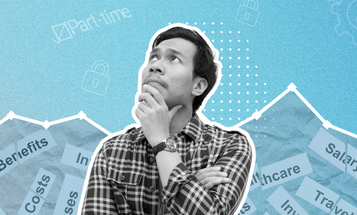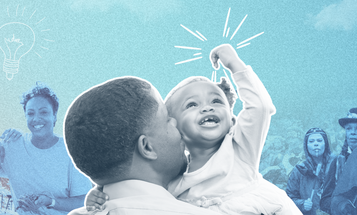
Few of us recall that the full name of the march where the Rev. Dr. Martin Luther King Jr. gave his "I Have a Dream" speech was the "March on Washington for Jobs and Freedom." Jobs, even before freedom. Today, Dr. King would be calling our generation to action because economic inequality and insecurity has risen sharply over the course of our lifetimes, to the point that we are the first in American history poised to be worse-off economically than the previous one.
Young people should remember that Dr. King was only 26 years old when he led the Montgomery Bus Boycotts in 1955. Twenty-six. And we shouldn't let the complexity of "the economy" get in the way of taking action. Just think of the economy as a massive, multi-player game where the most powerful gamers, whether it's businesses executives or government officials, are constantly tweaking the rules that make it easier or harder for some players and some teams to score points. And just like in a game, individual talent and determination matter in the economy -- of course they do -- but the rules of the game guide the outcome. And also like a game, it often matters most what team you start out on.
That's why we have to constantly ask a fundamental question: what is our economy for? What is the purpose of the game and therefore, what principles should guide the rules we set?
In Dr. King's time, the goal of economic policy was full employment and higher wages; the values were communitarian. Consider Robert Kennedy in 1963: "It is the essence of responsibility to put the public good ahead of personal gain."
Fast forward to 1982, when President Reagan boasted about wanting "to see an America in which people can still get rich." And he wasn't alone; leaders and economists in both parties began to believe that the best way for everyone to succeed was if the rules were written to ensure the greatest possible accumulation of wealth at the top and the biggest profits at the biggest corporations. The rich would drive the "growth," and money would trickle down to the rest of America.
So what rules needed to change to create a trickle-down economy? Well, since it is easier for some people -- particularly stock market investors and executives at a company -- to get rich if corporate profits are high because the costs of hiring workers is low, a low minimum wage and weak unions became a goal of organized business in the 1970s. As a result, the minimum wage has lost nearly half of its purchasing power since its peak in 1968, and fewer than 1 in 10 workers is now in a union. The rules of the economic game were also changed to make it easier for businesses to ship jobs to places with cheaper, more easily exploitable workers, to avoid paying their taxes, and to influence our elected leaders.
Back in 1955, corporations used to contribute nearly 30 percent of the federal taxes collected; today it's just 9 percent and dozens of the most successful U.S. businesses pay their CEOs more every year than they contribute to their country in taxes.
At the same time as the rules changed to make it easier for a small sliver of us to amass and keep unprecedented wealth, the rules didn't change to keep up with the changing times in ways that would have given more families a leg up -- like responding to the premium on education with more college grants, not fewer, or responding to the necessity of both parents working or the rise of single parents with financial help for child care, or by providing universal health care, portable pensions, or a more generous unemployment insurance system in the era of easy layoffs and downsizing.
How is it that life has gotten harder financially for the vast majority of Americans over the past forty years, yet we have had so few public solutions?
The problem is that our democracy has become as unequal as our economy. Over the course of my lifetime, an entire new industry has appeared: corporate lobbyists, for which there are now 24 for every member of Congress. The legalized bribery that is big-money campaign contributions increased by over 600 percent just since I turned 18, to over $2 billion a year. Members of Congress now spend 1 out of every 3 minutesthey're in office fundraising.
While not every business, even not every big business, is in Washington to push policies that disadvantage workers and families, the sum total of the flood of business cash and lobbying in Washington honestly drowns out the voices of regular families on a day-to-day basis. I know, I work there. Princeton political scientist Larry Bartels found that "the preferences of people at the bottom third of the income distribution appear to have no apparent impact on the behavior of their elected officials." None.
But something else happened in our culture. Why did it somehow become publicly acceptable to evade taxes as if companies and people owe nothing to their neighbors or to the country they live in? Completely okay to assert that any kind of public help -- from health care to unemployment insurance -- is unfair redistribution from worthy job creators to undeserving freeloaders? To demonize the class of people who in different eras were known as "the little guy," the little guy you root for?
This, I believe, is where the increasingly unexamined role of unconscious bias comes in to our public culture in ways that are eroding opportunity for all of us. Since Dr. King's time, we have had a deep and growing anxiety in this country about who is American.
Why do I say since Dr. King's time? Two things happened at once in the mid-1960s: the Civil Rights Act of 1964 finally decreed that the law could not discriminate based on skin color, upsetting the social order -- and the Immigration Act of 1965 began to change the face of America.
Did you know that until 1965, the United States had race-based national origin limits on who could legally immigrate into the country? There was a strict limit to the number of Asians and Africans, and even a limit on Southern and Eastern Europeans, who were considered ethnic; Northern European countries had no limit. And so the past 40 years have seen a dramatic transformation. Unfortunately and ironically, America became more diverse after the Civil Rights Movement subsided, taking it with it the moral voice calling for solidarity and brotherhood across racial lines. Instead, the loudest voices have been stoking resentment and division.
So why does this new diversity impact Americans' feelings about public solutions to common problems, about economic fairness and taxes and jobs? Is it because we are all racist? Not quite, but not no, either. The human brain naturally puts objects and people and ideas into categories -- it is part of our great intelligence. And it naturally takes shortcuts to do these categorizations: a red round thing on the table is an apple, fiji, macintosh or not, and an orange round thing is an orange, mandarin, navel or not. And apples are sweet, oranges are tart.
Our brain categorizes people by their physical characteristics as well -- and to go beyond that, it finds shortcuts to give meaningful attributes to those categories. And most of these shortcuts are going on subconsciously, without our conscious awareness.
The problem is that our society has been so hierarchical along these lines -- race, gender, age, sexuality -- that the shortcuts we are constantly primed to make have unequal consequences.
Studies of Implicit Bias where you are asked to quickly associate words with faces demonstrate that we are nearly universally less able to quickly associate darker faces with positive words, though white respondents find it more difficult than non-whites. All that is to say, prejudice and stereotyping is normal.
That doesn't make it acceptable, but it does make it understandable and it certainly means we can't keep pretending it's not still with us. America is the great multi-racial, multi-ethnic experiment in democracy! No other wealthy country tries to create a democracy out such diversity, and say that we all are supposed to feel like a community. We must see that as part of our exceptionalism: acknowledge the challenges and take a bit of good old fashioned American pride in working at it every day. We must not, as we have since the 1970s, wish it away under a myth that we can be colorblind.
If we don't acknowledge racial hierarchy and biases, our entire society will continue to fall victim to the inequities, instability and insecurity that comes when people don't feel like they're all in it together, when people are allowed to be just in it for themselves.
Dr. King knew this. He defined the state of true economic justice as attaining "the brotherhood of man." Now, I work in the field of economic policy. Never, not once, have I heard someone refer to the goal of economic policy as achieving the "brotherhood of man."
What would the brotherhood of man look like in economic policy? I think it would look like people being proud to pay taxes because that's paying back the investment the country made in your success -- and feeling like you need to help provide for our future, even though you may not recognize what the future looks like. And I think it would look like government and business and philanthropists working together to ensure that the basics of life -- a great education, a roof over your head, a way to care for your children or for yourself when you're sick, an old age with dignity -- were not out of reach for most Americans but were the minimum that we can guarantee for us all. And I think it would look like the CEOs of American companies seeing their job not just to create profits for investors, but to create good jobs, jobs with dignity for their fellow human beings.
Because when we say that the CEO of Wal-Mart, for example, is worth $10,000 an hour, whereas his co-worker is worth $7 an hour in the US or pennies an hour in the factory in India or Malaysia where the product on the shelves is made, what does that mean? When you see two smartphones, and one costs $30 and one costs $300, what do you decide? The more expensive one is better, of course.
Now see how easy it is to apply that same logic to human beings? And do you see how wrong that is? Dr. King did.
We are the children of Dr. King's dream because we are the most diverse generation in American history. But fundamentally, we are the children of his dream because we are the generation that is left to fulfill that dream. We have not yet attained the brotherhood of man in this country; in fact, as our racial anxieties have gone underground as the Civil Rights Movement ended, we have lost ground in achieving true economic justice in our society.
Fortunately for the future, our generation, having grown up hearing that you're on your own has decided that in fact, no -- we're in this together. According to public polling, more than any other generation since the Depression-Era generation -- the first Greatest Generation, but I promise you not the last -- we believe in individuals sacrificing for the common good, not just seeking out private gain.
That's why I believe that it will be us, the children of the Dream, who finally achieve a sustainable, fair economy, where everyone, regardless of what zip code or school district they were born into, can meet their basic needs and have a shot at fulfilling their dreams.



